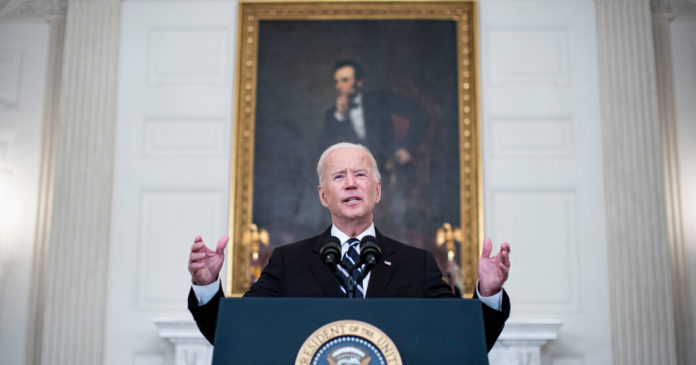
President Biden’s federal employee mandate, announced Thursday, will apply to employees of the executive branch, including the White House and all federal agencies and members of the armed services — a work force that numbers more than four million — but not to those who work for Congress or the federal court system, according to White House officials.
The mandate for health care workers will apply to those employed by institutions that accept Medicare and Medicaid reimbursement, including hospitals and nursing homes, according to the officials. It will be carried out by the Centers for Medicare and Medicaid Services, which regulates the health care industry.
“We would like to be a model for what we think other business and organizations should do around the country,” Jen Psaki, the White House press secretary, said.
She added that, aside from some religious and disability exemptions, the vast majority of federal workers would be subject to a 75-day grace period for receiving a vaccine.
The spread of the highly infectious Delta variant pushed the country’s daily average caseload over 150,000 for the first time since late January, overwhelming hospitals in hard-hit areas and killing roughly 1,500 people a day. The surge has alarmed Mr. Biden and his top health advisers, who see mass vaccination as the only way to bring the pandemic under control.
Mr. Biden had already pushed federal workers to get vaccinated by announcing that those who refused would have to undergo regular coronavirus testing. But the surge, coupled with last month’s decision by the Food and Drug Administration to grant full approval to the Pfizer-BioNTech vaccine to those 16 and older, convinced him to eliminate the option of testing, the officials said.
Companies had put off the question of whether to mandate for months, worried about potential litigation and employee pushback. But stalling vaccination rates and the rise of the contagious Delta variant put new pressure on executives. They were provided cover to go forward with requirements after earlier mandate moves by the Biden administration.
Soon after, Walmart, Walt Disney Company, Google and others said they would implement mandates. When the Pfizer vaccine received full federal approval late last month, Goldman Sachs, Chevron and others followed suit.
The mandates are a marked shift for a president who, mindful of the contentious political climate around vaccination, initially steered away from any talk of making vaccines mandatory. But the F.D.A. approval has strengthened Mr. Biden’s hand.
Some of the new requirements may prompt lawsuits, but Lawrence O. Gostin, a professor of global health law at Georgetown University, said Mr. Biden has broad latitude to compel vaccination, even for workers in private businesses.
“The federal government has ample power to regulate health and safety in the workplace,” Mr. Gostin said. “Employers have a legal obligation to comply with evidence-based federal health safety standards.”
Still, Mr. Gostin said, there is much more the president could do, including mandating vaccination for international or interstate travel.
One thing Mr. Biden cannot do is require all Americans to get vaccinated; in the United States, vaccinations are the province of the states.








